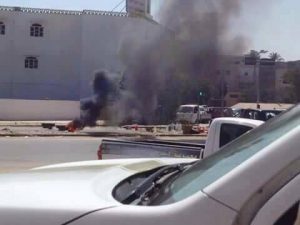By Sami Zaptia.

London, 14 July 2016:
The General Electricity Company of Libya (GECOL) has refuted claims that its organized power cuts to various parts of Tripoli or to the capital in general are politically motivated.
At a press conference held at its Tripoli HQ in Jibs Checkpoint, Swani Road yesterday, GECOL told the gathered media that it condemned these false accusatory rumours, adding that those behind the rumours wanted to ‘‘incite chaos’’ amongst the residents of Tripoli. It added that the power cuts were being ‘‘exploited’’ by ‘‘political quarters for personal gains’’.
GECOL agreed that power distribution was inequitable but that this was not initiated by its staff.
The company said that ultimately, consumption was higher than its total generation capabilities. This is especially the case when the temperature rises in summer or drops in winter. In summer, it is the widespread use of air conditions whilst in winter it is the widespread use of radiators and water heaters that lead to spikes in demand beyond generation capacities.
GECOL admitted that the ‘’security situation’’ (diplomatic speak for ‘’militias’’) means that when power cuts are enforced between cities and regions, they are not enforced equitably. It explained that when its central control room instructs regional power stations to divert power elsewhere, its staff are coerced into keeping power for their region at the expense of others.
The power generation deficit was caused not only by increased consumption but also by the poorly planned infrastructure of the company. When put under pressure, as has been the case in recent years, the system has not been able to cope.
GECOL also blames the power cuts on the various on-off military clashes across the country. In the western region it highlights the clashes in the Wirshafana area of Tripoli and it points out the clashes in south of the country. It also noted the war against IS in Sirte.
Today, GECOL warned in its daily news bulletin that the western and southern region generation capacity is 4,780 MW, consumption is 6,400 MW and therefore the deficit is expected to be around 1,620 MW. This it projects will today lead to 10 hours of power cuts.
GECOL has been struggling to keep power generation going as the creaking infrastructure struggles to keep up with increased demand. No sooner than GECOL announces that it has repaired a particular unit at a power station than it announces that another unit at another power station has failed.
This morning, for example, GECOL announced that the first steam unit at Zawia Dual Power Station went off grid due to an oil leak. Yesterday it announced that all the units at the Ruwais Gas Power Station and two units at Khoms Gas Power Station went off grid.
Libya’s power stations are in desperate need for high level maintenance. Libyan technicians have been praised for keeping the whole infrastructure going, however, the various power stations need advanced repair and maintenance by the foreign technicians of their manufacturing/construction companies.
However, the continuing insecurity in the country means that unless safe zones are created at least temporarily around power stations to allow for foreign technicians to carry out maintenance, the problem will get worse.
The power cuts have had a huge demoralising effect on the population especially at the peak heat of summer. Many students have had to revise for end of year exams on candle light. Owning power generators have become widespread for those who can afford them and can expend the time and energy to chase the required diesel to operate them.
Nevertheless, inexpensive small-scale domestic and commercial power generators work fine for temporary emergency back up, but Tripoli residents said that they cannot be a substitute for grid supplied power. They overheat and need constant filters and repairs.
Libyans have indeed been reduced to Maslow’s hierarchy of needs – permanently busy trying to secure the basic necessities of survival. However, the degradation of the quality of life caused by power cuts is in danger of tipping the whole country over the cliff edge.
Demonstrations, road blocks, the burning of tyres and rubbish and the politicization
of power cuts is threatening the whole stability of Libya even further. It is threatening the whole UN-backed Libyan Political Agreement and its Presidency Council and Government of National Accord as it fails to solve the country’s basic problems.






